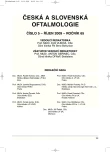Lucentis in Treatment of AMD CNV – Two Years Experience
Authors:
M. Molnárová; V. Lešková; P. Demský; R. Vida; M. Izák
Authors‘ workplace:
II. očná klinika SZU FNsP F. D. Roosevelta, Banská Bystrica, prednosta prof. MUDr. Milan Izák, CSc., FEBO
Published in:
Čes. a slov. Oftal., 65, 2009, No. 5, p. 182-185
Overview
In a study group of 114 patients (39 males ,75 females) with mean age of 72,5 years ( from 52 to 89 years ) with mean follow-up of 8 month we retrospectively studied the effectivity and safety of intravitreal aplication of ranibizumab = Lucentis in the case of wet form of age-related macular degeneration (AMD). All patients met the inclusion criteria. The treatmet was realized on outpatient basis under strict application protocol.
In the follow-up period the visual acuity improved in 66 patients (57 %), stabilization was achieved in 17 patients (24.9 %). In a group of 31 patients (27.2 %) the central acuity deteriorated. There were no peroperative complications. In the postoperative period we observed in 22 patients temporary rise of intraocular pressure, in 21 patients suffusion, and in 3 patients there were subretinal haemorrhages found, in 1 case rupture of RPE and in 1case anterior ischemic opticopathy was observed.
Results observed in this study are in full compliance with PRONTO and PIER studies.
Key words:
CNV AMD, intravitreal treatment, antiVEGF – Lucentis
Sources
1. Brown, D.M., Kaiser, P.K., Michelsm, M. et al.: Ranibizumab versus verteporfin for neovascular age-related macular degeneration. N. Engl. J. Med., 355, 2006; 1432–1444.
2. Ferrara, N., Gerber, H.P., Le Couter, J.: The biology of endothelial growth factor and its receptors. Nat. Med., 9, 2003; 669–676.
3. Ferrara, N.: Vascular endothelial growth factor: basic science and clinical progress. Endocrine Rev., 25, 2004; 581–611.
4. Ferrara, N., D’Amico, L., Shams, N. et al.: Development of ranibizumab, an anti-vascular endothelial growth factor antigen binding fragment, as therapy for neovascular age-related macular degeneration. Retina, 26, 2006; 859–870.
5. Goldberg, J., Flowerdew, G., Smith, E. et al.: Factors associated with age-related macular degeneration. An analysis of data from the first National and Health and Nutritional Examination Survey. Am. J. Epidemiol., 128, 1988; 700–710.
6. Ishida, S., Usui, T., Yamashiro, K. et al.: VEGF 164-mediated inflammation is required for pathological, but not physiological, ischemia - reduced retinal neovasculariosation. J. Exp. Med., 198, 2003; 483–489.
7. Kolař, P. a kolektív.: Věkem podměnená makulární degenerace. Grada Publishing, 2008; 148.
8. Matsuoka, M., Ogata, N., Otsui, T., et al.: Expression of pigment epithelium derived factor and endothelial growth factor in choroidal neovascular membranes and polypoidal choroidal vasculopathy. Br. J. Ophthalmol., 88, 2004; 809–815.
9. Rosenfeld, P.J., Brown, D.M., Heier, J.S., et al.: Ranibizumab for neovascular age-related macular degeneration. N. Engl. J. Med., 355, 2006; 1419–1431.
10. Shima, D.T., Nishijama, K., Jo, N., et al.: VEGF mediated neuroprotection in ischemic retina. Invest. Ophthalmol Vis. Sci., 45, 2004; E-abstract, 3270.
Labels
OphthalmologyArticle was published in
Czech and Slovak Ophthalmology

2009 Issue 5
-
All articles in this issue
- Diagnosing of Acanthamoeba Keratitis
- Current Therapeutic Approach in Non-infectious Uveitis
- Contrast Sensitivity and Higher Order Aberration after Conventional LASIK Treatment
- Changes of Higher Order Aberrations and Contrast Sensitivity after Standard Photorefractive Keratectomy
- Lucentis in Treatment of AMD CNV – Two Years Experience
- Combined Occlusion of Central Retinal Vein
- Comparison of the Threshold Interpolation and Whole-line Method on logMAR Chart and Snellen Chart for Visual Acuity Testing
- Benefit of the Surgical Treatment of the Idiopathic Intracranial Hypertension – a Case Report
- Czech and Slovak Ophthalmology
- Journal archive
- Current issue
- About the journal
Most read in this issue
- Diagnosing of Acanthamoeba Keratitis
- Current Therapeutic Approach in Non-infectious Uveitis
- Benefit of the Surgical Treatment of the Idiopathic Intracranial Hypertension – a Case Report
- Contrast Sensitivity and Higher Order Aberration after Conventional LASIK Treatment
